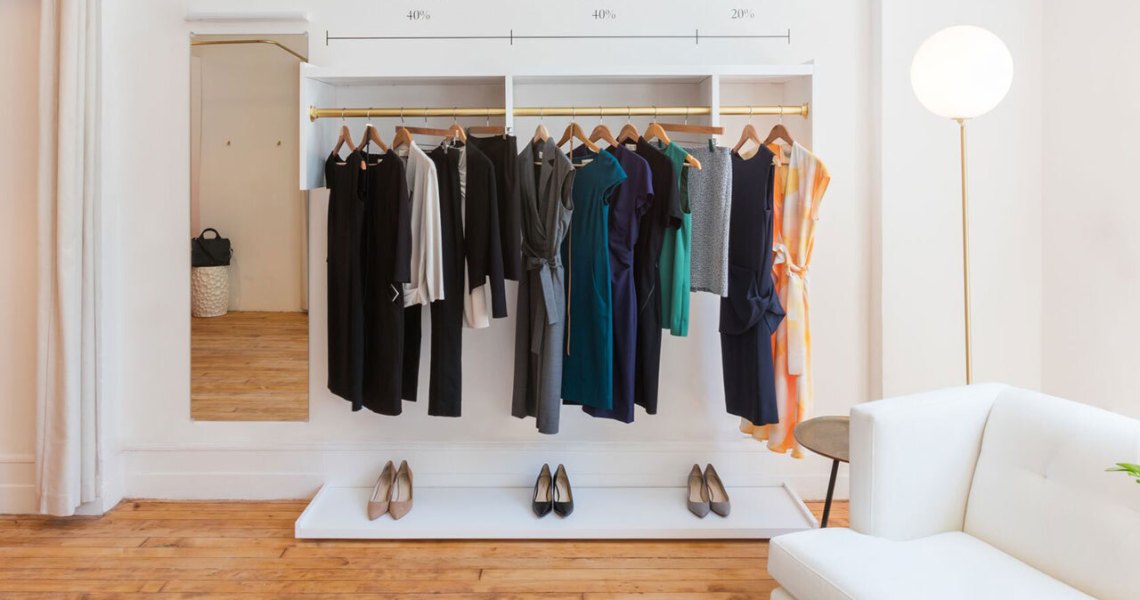As customer acquisition costs have skyrocketed through channels like social media, an unlikely acquisition channel has been making a comeback in the last year: the corporate shopping event.
These events, where companies treat their employees or their clients to private shopping trips, either by bringing them to a store or having the brand bring the shopping to them, are becoming increasingly popular. M.M.LaFleur, the womenswear brand that caters to office-appropriate styles, has seen a 50% increase in inbound requests for corporate shopping events in the last year, according to the brand’s founder, Sarah LaFleur.
LaFleur said these events aren’t something the brand has advertised since before the pandemic, when it pitched the events regularly to large companies. In contrast, the recent growth has been entirely organic.
M.M.LaFleur mostly hosts these events at its Bryant Park showroom location, but they have also been held at select M.M.LaFleur stores. But the team can also set up a shopping event within a company’s office or at another location chosen by the client. Often, the companies requesting these events are those requiring employees to be a bit more buttoned up, such as law firms, or those with clients they need to impress, like private wealth management companies.
LaFleur said there are a few potential reasons why she’s suddenly seeing far more requests for private shopping events. For one, fashion in general is trending away from the hypercasual looks of the pandemic and toward suiting, tailoring, dress shoes and other more formal wear. As that happens, LaFleur said she suspects the events are a not-so-subtle message from employers to their employees.
“The message that might be being sent is to step up your dressing game,” LaFleur said. “That’s especially if you work in client services. People got so used to dressing comfortably and casually, and certainly the casualization is still there in many companies. But as the return-to-office continues, having a day where employees can all have some drinks and try on nice clothes together can encourage them to dress up a bit more.”
That message is particularly important as more companies are asking their employees to return to the office and fewer WFH jobs are being offered this year. And while LaFleur didn’t have precise data to share, she said attendees at these private corporate shopping events almost always end up spending more than typical customers.
Ad position: web_incontent_pos1
“We’ve really honed our execution of these events at this point,” said Maria Costa, director of brand and integrated marketing at M.M.LaFleur. “The women there have fun and they hype each other up. Trying on clothes in front of your colleagues may seem a bit uncomfortable, but when you’ve got your peers telling you you look great or that you need to get [something], it feels like you’re just shopping with your friends.”
Costa characterized the lift that these events require as being “medium size.” They’re typically not too disruptive to normal business operations unless the event is being held in one of the brand’s stores. In those cases, expected revenue based on group size must make up for the lack of business during the time the store is closed.
M.M.LaFleur does charge a fee for the companies who book these events. Additionally, companies often buy gift cards to hand out to employees, guaranteeing revenue ahead of time. They will also occasionally pay an extra speaker fee for LaFleur herself to speak at the event.
Other brands beyond M.M.LaFleur have been experimenting with shopping events like these, including Krewe and Scanlan Theodore. The latter has a team that hosts 10-20 corporate shopping events at financial institutions across the country. In addition to being a revenue driver — one brand saw upward of $80,000 in sales from a single corporate event — these events serve as another touchpoint to meet new consumers that doesn’t require navigating the fickle algorithms of platforms like TikTok.
“We see it as a good source of customer acquisition and, essentially, free marketing,” LaFleur said. “Even if someone doesn’t actually come to the event, just getting the invite or hearing about it around the office is another avenue for them to hear about us, to get introduced to the brand. We try not to turn down these events and accept them whenever we can.”




